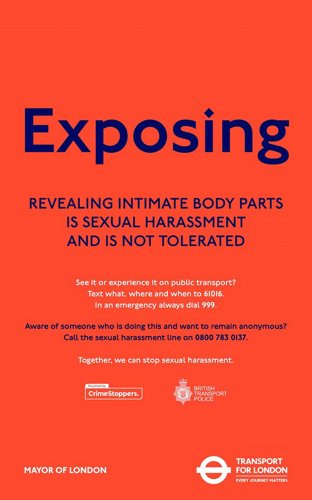Transport for London (TfL), in partnership with the Rail Delivery Group (RDG), British Transport Police (BTP), Metropolitan Police Service (MPS) and women’s safety groups, has launched a new campaign to tackle sexual harassment on its transport network. The campaign highlights various forms of unwanted sexual behaviour that can take place on public transport and aims to send a strong message to offenders that sexual harassment is not tolerated on TfL’s services.
Sexual harassment is a form of violence most often directed against women and girls in public places. TfL said that the safety of women and girls is an absolute priority, and this new campaign is one element of its work to ensure everyone can travel with confidence. The campaign aims to challenge the normalisation and dismissal of this behaviour as ‘something that happens’ to women and girls on public transport and in other public spaces, making it clear that it is never acceptable and that the strongest possible action will always be taken.
By raising awareness of the issue, TfL says it hopes to encourage Londoners to look out for and support each other, and to engage bystanders to speak up so that perpetrators can be held accountable for their actions. This could involve people learning to recognise the signs of sexual harassment, providing support to the person who is being harassed or reporting the incident.
TfL highlighted that sexual harassment does not only affect those who are directly targeted but can affect how safe all women and girls feel when travelling. A Centre for London survey from 2019 found that women were nearly twice as likely as men to mention personal safety as a barrier to walking and using public transport. Research also shows that nearly half of those who experience sexual harassment do not tell anyone. The campaign encourages customers and staff who experience or witness this behaviour to report it, which TfL said helps it and the police to put the right interventions in place to stop it happening again and bring offenders to justice.
The new campaign builds on efforts by TfL and police to tackle unwanted sexual behaviour on public transport through Project Guardian and the award-winning ‘Report it to Stop it’ communications campaigns – both of which aimed to improve reporting levels and to create an environment on the network that does not tolerate intimidation and sexual harassment. The campaign will also include magazine and newspaper advertising, editorial partnerships and other communications. The materials, which will appear on buses and trains and at stops and stations, will help educate passengers about how to report incidents.
Other measures to keep people safe on the network include more than 2,500 police and police community support officers and 500 TfL enforcement officers patrolling, thousands of frontline transport staff present across the network to support customers and an extensive CCTV network. The police also carry out targeted policing and investigation activity to identify and apprehend sexual offenders. TfL will also join forces with the British Transport Police and Metropolitan Police Service for a week of action to mark the launch of the campaign. The activity will include high visibility reassurance policing patrols and engagement activity with passengers to give them an opportunity to speak to the police about this issue and any concerns they have. Targeted police activity to deal with known offenders or hotspot locations will continue during the week of action.


